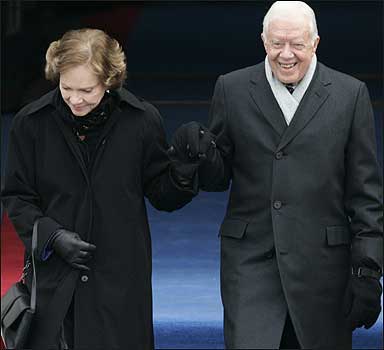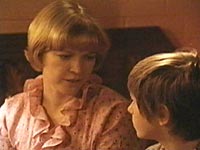 Buddha Collapsed Out of Shame is an astonishingly assured debut feature from Hana Makhmalbaf (see post below). It is the story of a young girl (not even 9, the age of maturity in Islam) who just wants to go to school. The film follows the great Iranian custom of offering social commentary by positioning it safely in the world of children. Baktya's attempts, first to buy a notebook by selling eggs, and then to find the school itself, reflect the continuing legacy of post-Taliban Afghanistan. A gang of boys who are role-playing war and Taliban autocracy capture her and her friend, and come near to killing her in a game. In the end, her own ingenuity turns her small errand into a quest of enormous proportions, all played out against the empty-caved ruined facade of mountain edifices stripped of their Buddhas. At one point, a boy picks up a rock to stone our heroine and tells us it is the remnant of the eye of one of the destroyed Buddhas. The film's harrowing last shots spin (literally) the story to its conclusion and provide its emotional highest point. An incredibly impressive feature in the tradition of strong first films by the women of Makhmalbaf Film House.
Buddha Collapsed Out of Shame is an astonishingly assured debut feature from Hana Makhmalbaf (see post below). It is the story of a young girl (not even 9, the age of maturity in Islam) who just wants to go to school. The film follows the great Iranian custom of offering social commentary by positioning it safely in the world of children. Baktya's attempts, first to buy a notebook by selling eggs, and then to find the school itself, reflect the continuing legacy of post-Taliban Afghanistan. A gang of boys who are role-playing war and Taliban autocracy capture her and her friend, and come near to killing her in a game. In the end, her own ingenuity turns her small errand into a quest of enormous proportions, all played out against the empty-caved ruined facade of mountain edifices stripped of their Buddhas. At one point, a boy picks up a rock to stone our heroine and tells us it is the remnant of the eye of one of the destroyed Buddhas. The film's harrowing last shots spin (literally) the story to its conclusion and provide its emotional highest point. An incredibly impressive feature in the tradition of strong first films by the women of Makhmalbaf Film House. Chacun Son Cinema is a collection of loving hommages to the movies by some of the world's most gifted filmmakers. Each of the directors chosen to express their love of cinema in 3 minutes has in some way been impacted by the Cannes Film Festival, and the collection is meant as a tribute to the 60th anniversary of that annual event. Part of the fun was trying to match the filmmaker to the short before the credits rolled after each section. I remember writing somewhere below that Alejandro Inarittu was worth watching out for in this collection, because of the acuity with the short form that he demonstrated in the 09'11"01 omnibus. He has done it again. A woman clutches her boyfriend's hand during a screening of La Cieca di Sorrento, starring Anna Magnani. The opening shot is of these clutching hands, as we hear from the hidden movie screen "he loves you tenderly, terribly, tragically." As the camera rises, we see that the woman is both blind, and crying. The boyfriend gently whispers in her ears the action of the film. Overcome by it, she leaves. The boyfriend follows her outside, embraces her and calls her Anna. The parallels of screen and life are nuanced but powerful since the movie on the screen is about a blind woman. The woman in the audience and the character on screen have become one in that rarified experience that only cinema can bring. In the moment of turning to embrace her boyfriend, we hold on her eyes. This filmmaker, the director of Babel and other astonishing films, is truly a genius of capturing the emotional line of a film. There is just no one like him.
Chacun Son Cinema is a collection of loving hommages to the movies by some of the world's most gifted filmmakers. Each of the directors chosen to express their love of cinema in 3 minutes has in some way been impacted by the Cannes Film Festival, and the collection is meant as a tribute to the 60th anniversary of that annual event. Part of the fun was trying to match the filmmaker to the short before the credits rolled after each section. I remember writing somewhere below that Alejandro Inarittu was worth watching out for in this collection, because of the acuity with the short form that he demonstrated in the 09'11"01 omnibus. He has done it again. A woman clutches her boyfriend's hand during a screening of La Cieca di Sorrento, starring Anna Magnani. The opening shot is of these clutching hands, as we hear from the hidden movie screen "he loves you tenderly, terribly, tragically." As the camera rises, we see that the woman is both blind, and crying. The boyfriend gently whispers in her ears the action of the film. Overcome by it, she leaves. The boyfriend follows her outside, embraces her and calls her Anna. The parallels of screen and life are nuanced but powerful since the movie on the screen is about a blind woman. The woman in the audience and the character on screen have become one in that rarified experience that only cinema can bring. In the moment of turning to embrace her boyfriend, we hold on her eyes. This filmmaker, the director of Babel and other astonishing films, is truly a genius of capturing the emotional line of a film. There is just no one like him. Also memorable from this collection was Abbas Kiarostami's meditation, "Where is my Romeo?" The camera plays gently across the faces of Iranian women watching the ending of Zeffirelli's Romeo and Juliet which (as in the case of many of these shorts) we only hear. Each woman's expression is a jewel, and the filmmaker is playing on our knowledge of the end of that famous story.








































